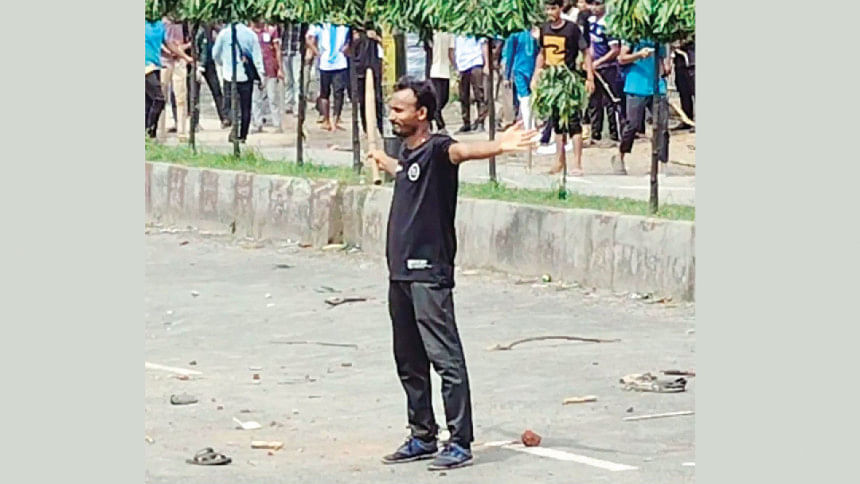July 16, 2024: Nationwide mayhem leaves 6 dead

July 16, 2024, marked a grim escalation in the quota reform protests as violence swept across Bangladesh, leaving at least six people dead, including three students, and hundreds injured in fierce clashes involving protesters, Chhatra League activists, and police.
In Chattogram, three people were killed during confrontations between quota reform protesters and Chhatra League activists. Among the dead were Wasim Akram, a student of Chittagong College; Faisal Ahmed, a management student at Omargani MES College; and Md Faruk, an employee at a furniture shop. Hospital sources confirmed that Faruk had sustained bullet wounds while Akram was stabbed. Thirty others were injured, two critically. The violence erupted after Chhatra League men occupied the rally venue at Sholashahar Railway Station, sparking chaos at multiple nearby locations including Muradpur and Gate No 2.
In Dhaka, pitched battles raged for over seven hours in Science Lab and Dhaka College areas. Two people died in the clashes—Md Shajahan, a 24-year-old hawker with a makeshift shop near Balaka Cinema Hall, and Sabuj Ali, 25, who suffered critical head injuries. Both were declared dead at Dhaka Medical College Hospital. Shajahan's mother, Ayesha Begum, broke down at the hospital, crying, "My son had nothing to do with the protest. Who killed him?"
The Science Lab intersection turned into a war zone as protesters—mostly college students—engaged in running battles with stick-wielding Chhatra League activists. Brick chunks flew as both groups chased each other back and forth between 1:45pm and 8:45pm. At least 127 people were injured, including two police officers. Around 7:00pm, they chased away former Awami League MP Haji Salim near LabAid Hospital, forcing him and his aides to take refuge inside the building.
Clashes also erupted in Chankharpul, Rayshahebbazar, Mirpur-10, Bhatara, and Farmgate. At Rayshahebbazar, five students—including four from Jagannath University and one from Kabi Nazrul Government College—were shot during an attack carried out by Awami League and Jubo League men.
In Rangpur, tragedy struck when police opened fire on students protesting at Begum Rokeya University. Abu Sayed, 25, an English department student, was shot in the chest. A widely circulated video showed him standing with his arms outstretched before collapsing. He was declared dead at Rangpur Medical College Hospital. Around 30 other students were injured in the incident. A haunting image of Sayed with his arms raised—moments before he was shot—quickly became an icon of the movement, symbolising student defiance in the face of state violence.
Tension flared further when students tried to bring Sayed's body back to campus. Police intercepted them and sent the body for autopsy. In response, enraged students set fire to the vice-chancellor's residence and vandalised five university vehicles. Vice Chancellor Prof Abdur Rashid, along with staff and faculty members, was confined inside the building for hours before being rescued by law enforcers. Students also set fire to a Chhatra League leader's room at Bangabandhu Hall.
The violent turn of events followed a massive swell in protester numbers after the previous day's attack on Dhaka University students. Students from private universities and colleges joined in droves. Major thoroughfares including Jatrabari, Shantinagar, Science Lab, Motijheel, Badda, Tantibazar, Uttara, and Beribandh were blocked, bringing traffic to a standstill. Protesters also halted trains at Mohakhali for over six hours and obstructed highways connecting Dhaka to Chattogram, Sylhet, Tangail, and Mymensingh.
The government responded by deploying Border Guard Bangladesh (BGB) in Dhaka, Chattogram, Bogura, Rajshahi, Rangpur, and Gazipur. It closed all secondary schools and colleges indefinitely and postponed the Higher Secondary Certificate (HSC) exams scheduled for July 18. Late at night, the University Grants Commission announced that all public and private universities and their affiliated colleges would be closed until further notice, instructing students to vacate their dormitories.
Hasnat Abdullah, one of the protest coordinators, condemned the day's events as "state-sponsored attacks." Another coordinator, Asif Mahmud, announced plans for a symbolic "coffin procession" and gayebana janaza at Raju Bhashkarjo the following day at 2:00pm to honour those killed. He urged students from across the country to join in remembrance and resistance.
As the day came to a close, the scale of destruction, trauma, and fury left no doubt that July 16 would be remembered as one of the darkest days of the quota reform movement—cementing a turning point in the nationwide uprising.

 For all latest news, follow The Daily Star's Google News channel.
For all latest news, follow The Daily Star's Google News channel. 








Comments